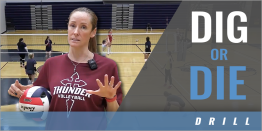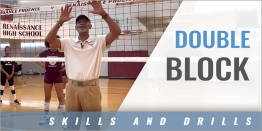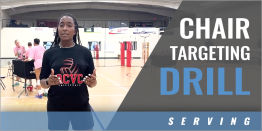|
By: Craig Skinner, Women's Volleyball Coach - University of Kentucky Originally published in: Coaching Volleyball Magazine
I was flattered when the AVCA asked me to write this article and was thinking to myself, "Sure no problem." Then about two weeks later when it dawned on me that I was basically writing a "term paper," I quickly realized that I hadn't written anything this long in about 15 years. I feel like I am back in college again...uh oh. I was asked to do an article about how we have had the success at Kentucky that we have had in a short period of time. The title I thought of is probably something that had been written about before, but I thought it was relevant to our current situation. Every coach has a philosophy on training, pertinent statistical information that he uses, and a way he physically develops his athletes. All of these things along with the x's and o's of coaching have a significant impact on results. The points I will touch on below don't necessarily belong in a coaching manual, but I believe they are as, or more, important than how you teach an arm swing. Having success with your school can be done in several different ways, and I continually observe other programs and their successes to see if there are things that we can do at Kentucky to improve. I believe that the following areas are paramount in laying the foundation for the culture of your program. People When I came to interview for the job at Kentucky I was really impressed by the people with whom I interviewed in the six hours I was on campus. Starting with Mitch Barnhart, our athletics director, and Lisa Peterson, our senior women's administrator, I was so impressed with them that I knew we could have a great working relationship and I could trust their vision for volleyball at Kentucky. Mitch and Lisa were major influences of why I wanted to be a part of the University of Kentucky for my first head coaching position. I have always believed that if you want to develop a culture of success, the people on your staff must be involved. Your staff must compliment your personality. It's important to have a variety of personalities on your staff because each team has a variety of personalities, and they all relate differently. I also believe that each person on staff must be passionate, competitive, and trustworthy. This meant that my first priority when I accepted this position was to hire people who embodied these qualities. Robert Pulliza, Jenae Dowling, and Sara Sjuts as Director of Operations, absolutely accomplished this goal. I knew that when recruits and their parents met them, the parents could trust that their daughter would have a great experience being a student-athlete in our program. Since then, Lauren Sauer and Chris Beerman have come on board, and we haven't missed a beat in terms of passion, competitiveness and trustworthiness. I truly believe that our players feel extremely comfortable knowing they are getting trained at the highest level on the court, that they will be around great people and that they have mentors that can help lead them in their careers off the court. Having great people in this program doesn't stop with our coaches and director. Stephanie Tracy, our strength coach, and Amy Craiglow, our academic advisor, spend countless hours with our athletes and are critical to their motivation as student-athletes. I don't think you can underestimate how important it is to have quality people in these positions. I have total confidence that they will have a positive impact on our players' lives in college. I also wanted people in our manager positions that I trusted, that our staff liked being around and our players felt comfortable being around for hours upon hours. To some, this may be a minor thing, but to me it meant a great deal. Managers probably know and hear more information that coaches talk about and are the closest to your players on a social level. You must trust them and they must know that all things talked about in the office, stay in the office. There is no question in my mind that when athletes look back on their college careers, the first thing they are going to think about are the experiences they had with the people around them. I consider our assistants, director of operations, academic advisor, strength coach, trainer, and managers as all being a part of the immediate staff. We, as coaches, and our players interact with these people on a daily basis and they all can have a very positive impact on each of your athletes. Therefore, when I have had changeover on my staff, I have taken the time needed to find the right person. Coach at a Place that you Believe In Over the years I have had a few opportunities to pursue both assistant and head coaching positions. Some of them I believed in and others I was less inclined to pursue. From the outside looking in and within an hour of being in Lexington, I could see that Kentucky was definitely the former, not the latter. Lexington was a beautiful place, a college town and a great place to raise a family. I believe that recruits and parent' can see immediately whether you, as a coach, believe in the program that you are heading. For me, there are several things that convinced me that I wanted to come to UK. First of all, the athletic staff had a big vision for the department as a whole. The people at the university and the community were sincere, genuine people that cared about the development of our student-athletes and the success of our program. It was a place that I felt strongly that I didn't have to be a used car salesman to recruit the best athletes possible. Men's basketball had won multiple national championships. And, there was a great vision for volleyball from our administration. These are reasons that I could see myself being at Kentucky. There may be numerous other reasons that you as a coach may see yourself coaching at a different university. The most important thing, though, is that you see yourself being confident and comfortable as the leader of your program. It doesn't matter what the media, your friends, or colleagues think. It only matters what YOU visualize and believe! When you firmly believe in your program, it allows you to communicate and express your belief with ease to your players, recruits, and parents. Recruit, Recruit, and Recruit!! You're probably thinking that this is obvious and everyone knows this. Well, .......IT's TRUE!! We are all much better coaches when we have better players. Obviously, you want to find the most athletic, most gifted and smartest players you can find. The most important thing is that we don't stop working after near misses and we never settle. We all have the recruits that we really want that end up elsewhere. Keep turning over stones until you find another good fit. As much as possible, you want to avoid settling for a player that wants to come to your program just to fill a recruiting class. Typically this player won't contribute much and managing unhappy people is draining. It takes energy away from your focus on the players that have a positive impact on your team. It's amazing how much time you end up spending on players that are a distraction. Most of the time, your program will live with this mistake for FOUR years unless the athlete decides to transfer. It is better to hold a scholarship until you come across a better fit for the program or wait to use it for the following class. One thing that I believe you must have in your recruits is that they must do something exceptional. They should be the best athlete, the best "baller," hit extremely hard, have the highest IQ or the most mentally tough. If they do something exceptional, they will help you develop a culture of winning by excelling at something you need on your team. Being competitive is something that I think you can't overlook in recruiting either. As coaches, I believe we are pretty competitive as a group. One of the most frustrating things in coaching is working with non-competitive athletes. If they touch 10 feet, but would rather go shopping than win a match, you're in for a long four years. Whether hiring someone on your staff or recruiting athletes, being competitive is a must-have characteristic! Begin with Ball Control and Setting If you only have time to instill two things in your first couple of seasons, make those ball control and setting. With these two things, you can be competitive in almost every match. If you don't have those currently on the roster, find one player for each skill. Find a setter that is really competitive, makes good decisions and locates the ball. Easier said than done, but no matter her height, I believe you can find a player that can do this for you. On the ball control side, add a defensive specialist from an experienced club that has good ball control. Our first two classes included a setter and a DS/libero. When you can immediately increase your setting, ball control and defense, this will improve almost all other areas of your team. Your team will suddenly be a better attacking team because of your increased efficiency at handling the ball and delivering consistent sets. This sounds like a no-brainer, but average hitters all-of-a-sudden become much better. In the first couple of years, it's more difficult to recruit a four kill per game hitter than it is a good setter and ball-control players. As your team improves, those types of hitters become more interested in coming to your program. Other than an increased skill level, practicing with better ball control and setting will also improve your team's confidence. This confidence becomes contagious, the players start carrying themselves differently, and they can sense they're going in the right direction. Your team will gain invaluable belief in the system you are trying to instill. If you can't control the ball to run a pass-set-hit drill, you can forget about the confidence needed to Win. Not only do you need to recruit the players to set and control the ball, but you need to spend the majority of your time in practice training these skill sets. Spend less time talking about how to execute a skill and more time doing the skill. If 40-50% of your practice time is allotted to ball control and defense for an entire season, I guarantee your ability and confidence levels will improve tremendously. As the season progresses, your time allotment may change, but the emphasis should not change at all. Evolve and Tweak As you begin coaching a program, you are going to instill your philosophy of coaching and begin to establish what your identity is as a program. How you train and your teaching philosophy is pretty straightforward. The identity part isn't as easy when you inherit the current players in the program. If you as a coach believe that being physical or getting 15 kills per set is the best way to be successful, you may have to evolve into that over the course of time. You may have to instill things in the early years that don't necessarily coincide with your vision for the program's identity. In 2005 we played a libero and two DS's to make sure that our ball control was as good as we could make it. The following two years our most consistent passer/defender was a middle attacker, so she played all six rotations and we had our libero go in for our outside hitters. This isn't necessarily a traditional system, but it worked for our athletes on our roster at the time. Since then we have gradually gotten closer to how I want Kentucky volleyball to be identified. In practice, we focus on the things that can be our strengths and spend a lot of time trying to perfect those things that have made us successful so far. After each season, we study ourselves and identify the things that need to change or improve. Our core beliefs typically stay the same, but there may be slight changes in how we approach things. For example, in 2008 we played our libero at left-back. This spring we trained the libero at middle-back and it seems to be the right thing for us this year. The simple reason we looked at this was because we think it fits our personnel better. Never change just to change. When you tweak things, it must be best for your personnel and not because it worked for another program or team. We are always trying to find a way to highlight the individual strengths of our players. This will not only make our team better, but it builds confidence. Very few things decrease confidence more in a player than spending hours trying to make her weakness a strength. Vision for Success Your current players and the ones you are recruiting need to know your vision for success and they play an integral part in getting there. Usually, you don't become a head coach of a program when it's at the top of the conference. Therefore, the current players probably lack confidence in themselves and the program. Remember that there is always something special in each of your athletes and they can help you win now! If this isn't the case, fake it. Those players need to know that you have confidence in them! All programs are bigger than any one person, so I think it's important that everyone involved, especially the players, feel a sense of ownership in the program's vision and that they are an asset to the team. Immediately, I believe you need to set a goal to win your conference championship. Realistically, this may or may not happen, but that is why you are training. There are probably a couple other team goals that may be more realistic in your first season and must be set. After you initially set the goals, you don't need to talk about them again until after the season. The team needs to feel from you that they have what it takes to help the program get back on track and that you aren't looking forward to replacing them. Obviously, you are going to recruit the best players out there, but you are going to train the current team like they are champions. Most importantly, each day is an opportunity to "get better" regardless of your last result. This needs to be the focus and not your wins and losses. The last thing you want to talk about every day is the "big picture." You and your players need to be focused on the little things that it takes to be good. Incremental improvement and the process of getting better each day, each week, and each month will help you achieve the "big picture" goals that you have set for the program. As your program grows and continues to improve, this vision for success may change a little each year. You hope to annually raise the bar as the program grows, but you will need to continually challenge yourself and your team to dream big. Ultimately, we are in this profession to win. I understand the fact that we are also are in it to provide a great experience for our student-athletes and help them grow as people. If you aren't providing a great environment for your athletes, you may have a hard time keeping your players and recruiting new ones. But, we as competitors know that we want to strive for as many "Wins" as possible. Keep your vision clear and know that your players want the same thing. Once you have accomplished your first vision, raise the stakes. Final Thoughts There are several things that you need to do as a coach to help your teams be as successful as possible. There are philosophies of training, statistical goals, athletic performance improvements and financial resources that will assist you to compete at the highest level possible for your program. We all have our individual needs and wants that we believe are the next step to success and these typically involve money. Hopefully, the concepts that I have talked about above can be of assistance to almost any program regardless of division or conference, and can be applied with little financial need. Over the course of time, these concepts will change or steer in a slightly different direction, but these core areas are key to developing a winning culture: If you have good people associated with your program, you will continue to believe in where you are, which will drive you to get great players. If these great players can pass and set, you will become more competitive, allowing you to tweak your system when necessary. This builds their confidence, which in turn creates a culture – and a program – where your players understand the overall vision and enables them to have ownership in it. About the AVCA... The mission of the AVCA is to develop the sport of volleyball and its coaches. With a membership of over 5,100 and counting, the AVCA provides a professional network for those individuals and companies dedicated to enhancing and promoting the sport. Members include collegiate, high school, club, youth and Olympic coaches, as well as volleyball club directors. The AVCA provides education to volleyball coaches, recognition of elite players and coaches, promotion of volleyball competitions throughout the world, and networking opportunities for volleyball products and services providers. For more information on AVCA member benefits and how to join the organization, Click here
|






